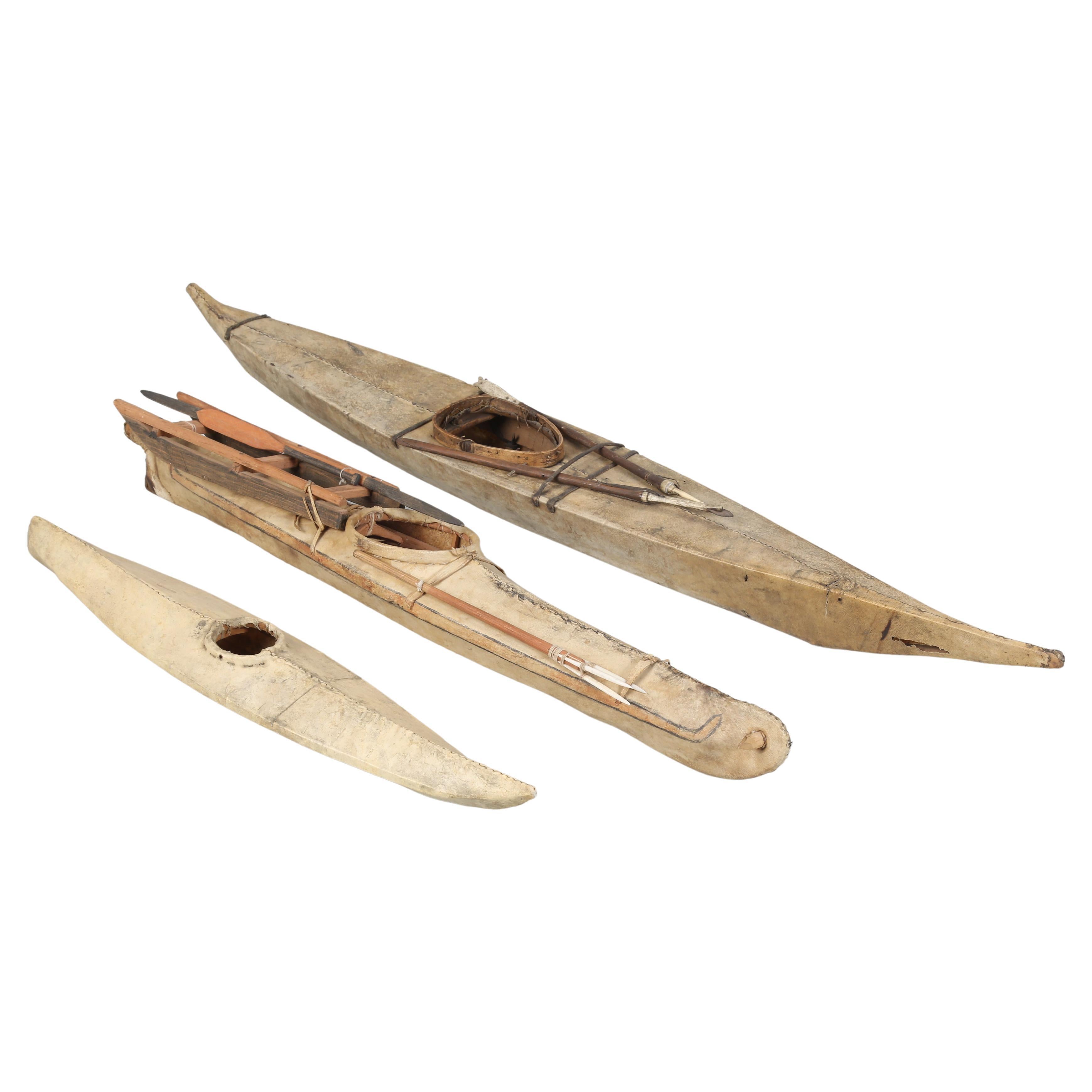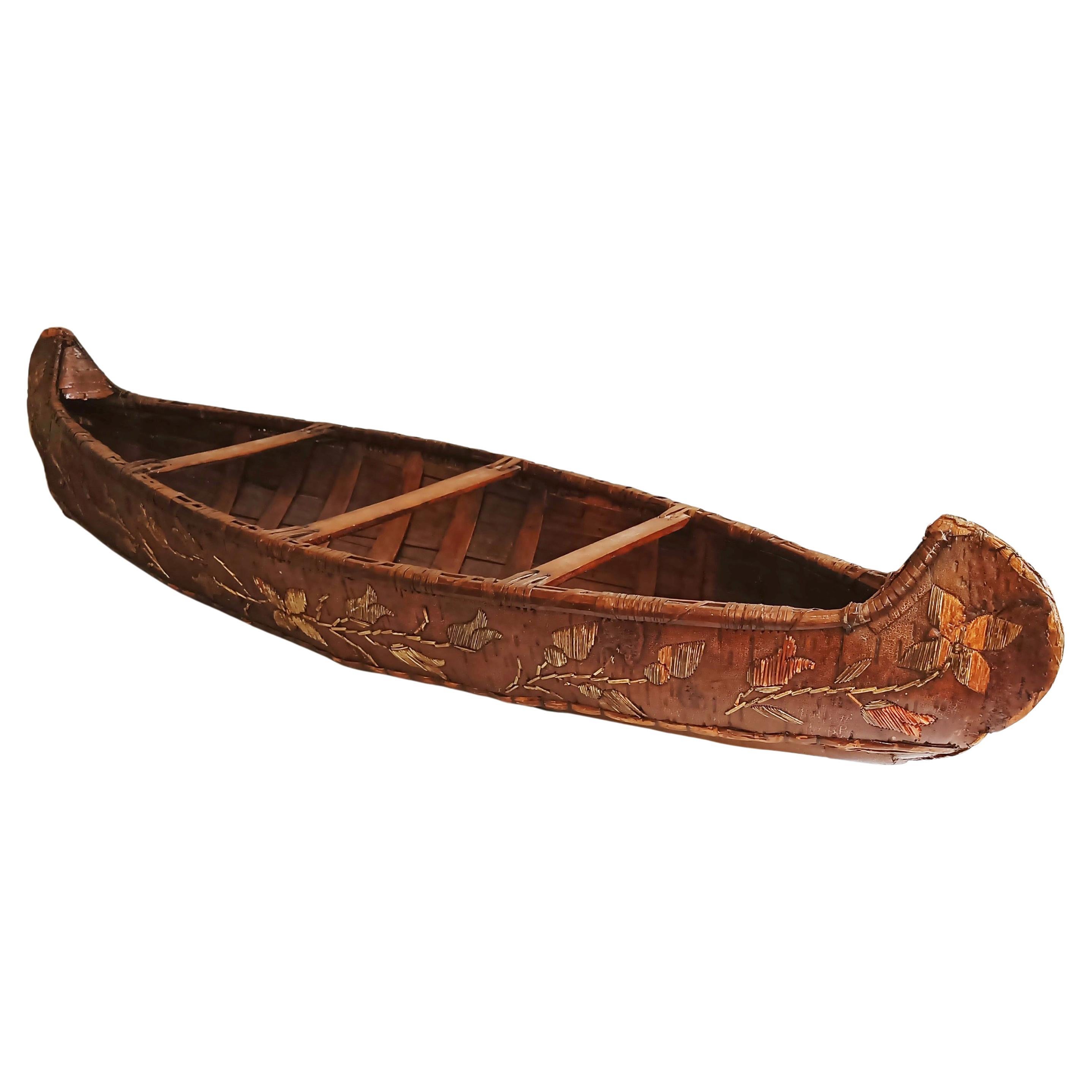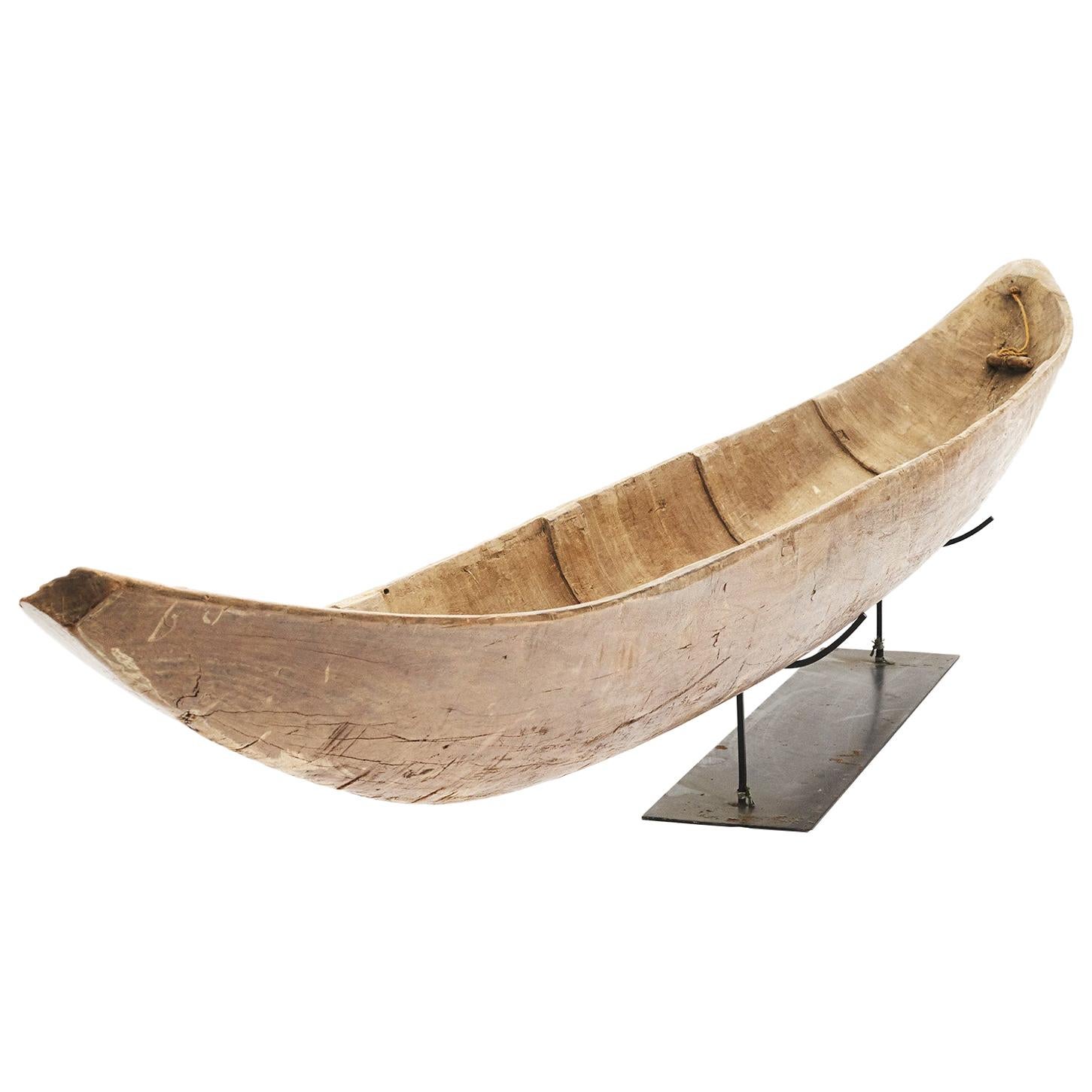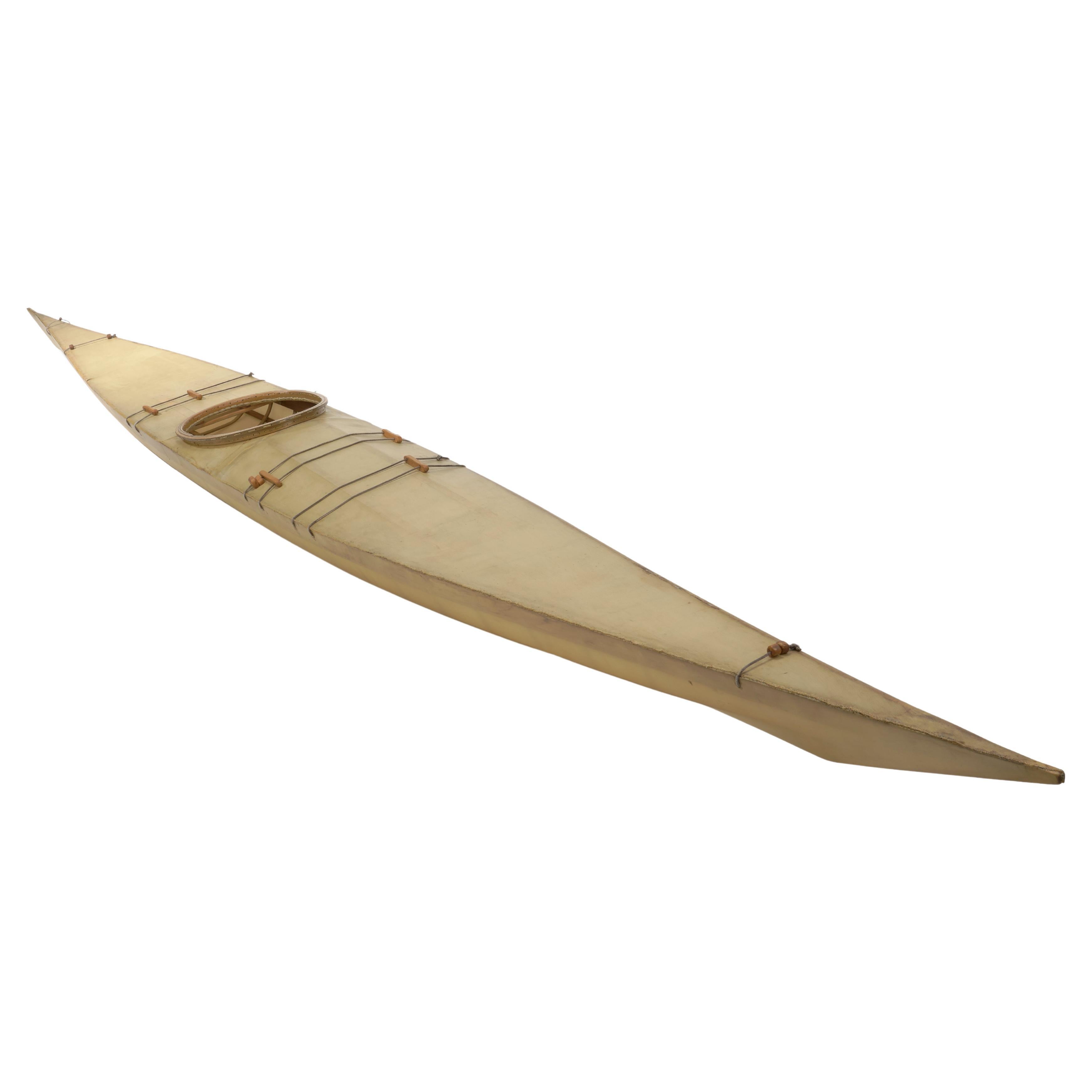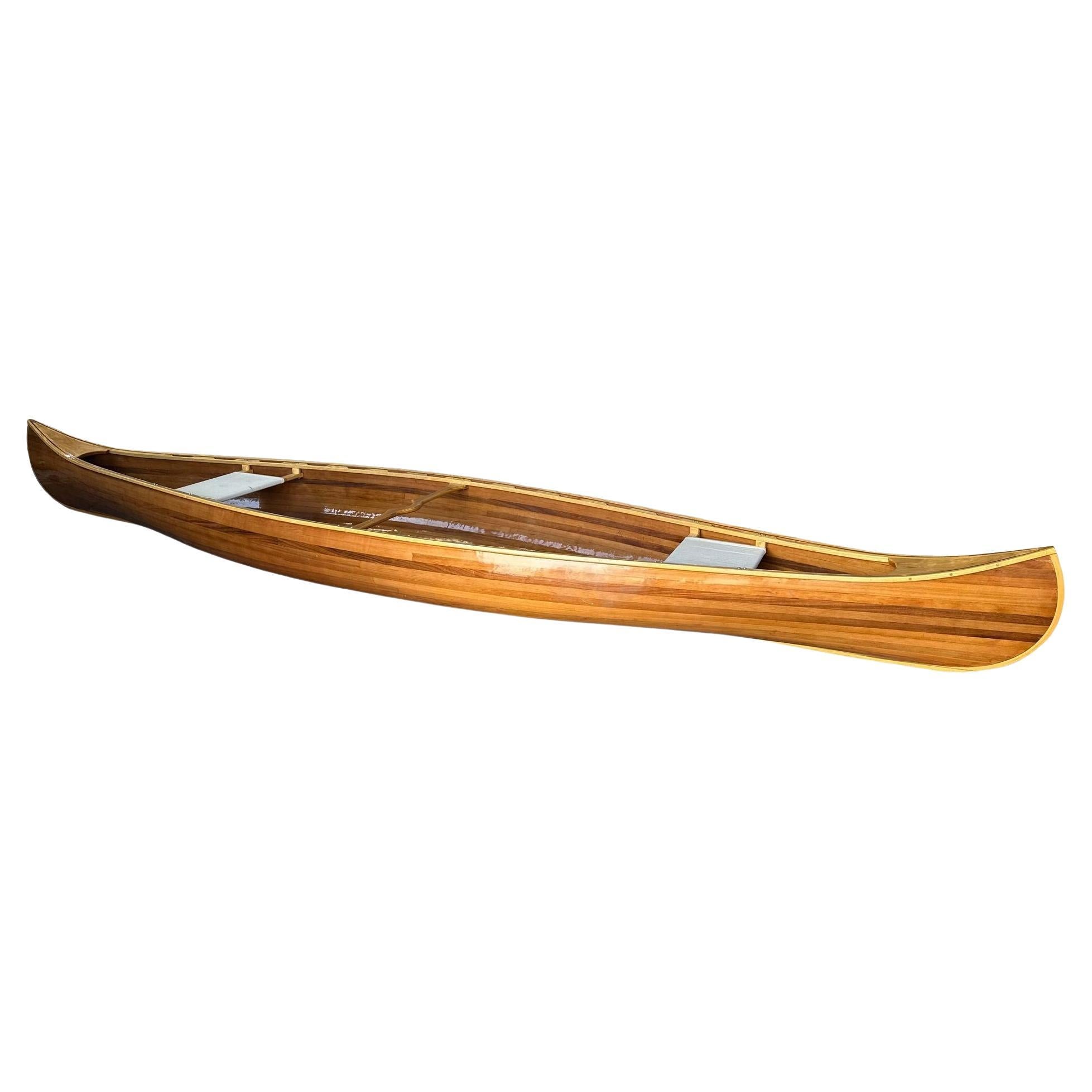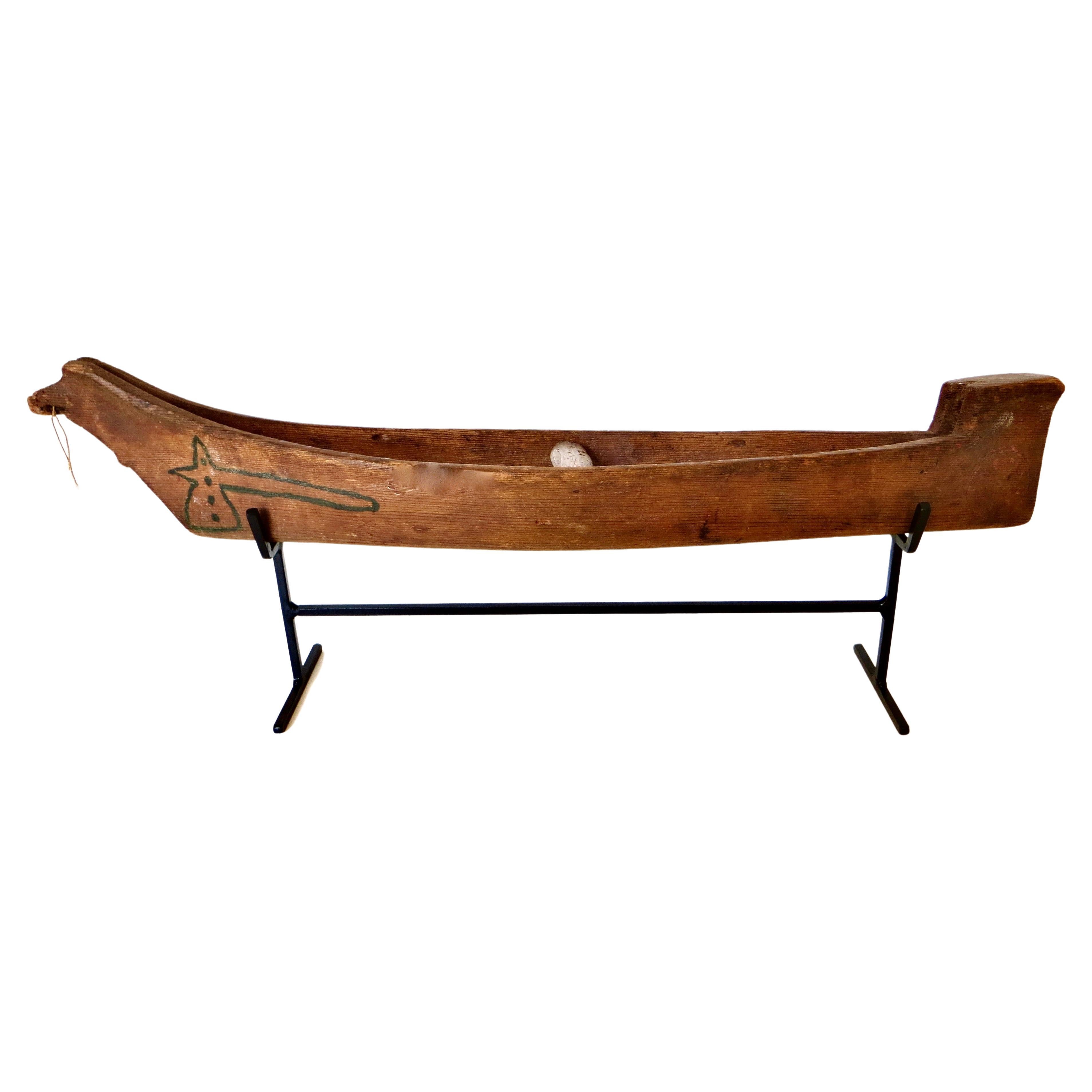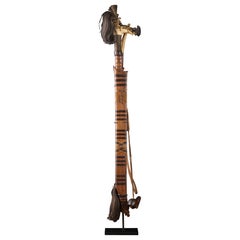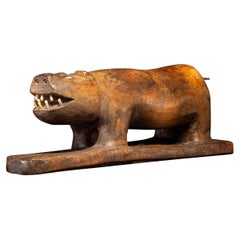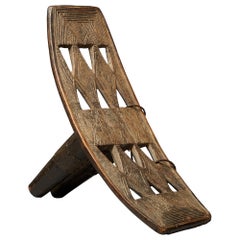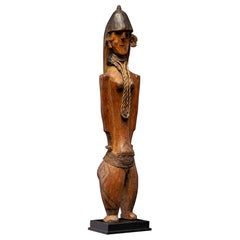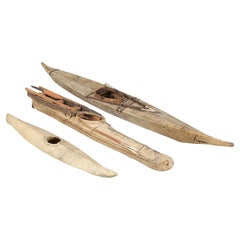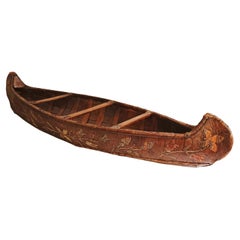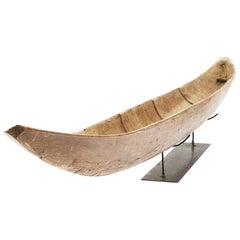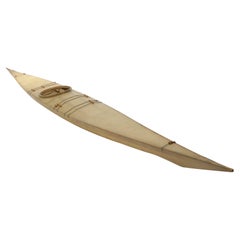Items Similar to Eskimo Model Kayak, Wood Covered with Seal Skin, Lined with Bone
Want more images or videos?
Request additional images or videos from the seller
1 of 6
Eskimo Model Kayak, Wood Covered with Seal Skin, Lined with Bone
$5,909.33
£4,355.15
€4,950
CA$8,088.57
A$9,059.62
CHF 4,714.02
MX$110,028.51
NOK 59,761.85
SEK 56,389.75
DKK 37,672.73
Shipping
Retrieving quote...The 1stDibs Promise:
Authenticity Guarantee,
Money-Back Guarantee,
24-Hour Cancellation
About the Item
What makes this model so special is that all the hunting devices are still present: spears, harpoons, spear thrower, wood float board, and bladder, paddles and other equipment used for seal hunting. Please note how well these are made in a stunning combination of wood and bone and lashed on deck under bone and sinew spear securers. Despite the kayak frame traditionally being made by the men, it was the Eskimo women who tanned the seal hides and sewed them together to make the waterproof skin of a kayak. The women would grease the seams with seal blubber and fish oil to make sure they were watertight. The outer skin had to be renewed at least every two years. It had a driftwood or bone frame. Apart from the double paddle used to propel the kayak in the water, a harpoon, spear and swimming skin was also fastened to the kayak when hunting. The harpoon and spear would be tied to the boat using leather straps and would often trail in the water besides the hunter when not in use. The swimming skin or bladder would be fastened behind the paddler tied to the harpoon to prevent a speared seal from diving away from the hunter. The main use of an Eskimo kayak was for hunting, and seals, walruses, birds and even reindeer were all hunted using kayaks at sea. Eskimo people still use kayaks to hunt from today. In the past, kayaks were even used to deliver mail to the more remote parts of Greenland. The famous ‘Eskimo Roll’ manoeuvre was developed by traditional kayak users to enable them to raise a capsized kayak in rough seas with a single stroke of their paddle.
- Dimensions:Height: 5.52 in (14 cm)Width: 61.03 in (155 cm)Depth: 5.91 in (15 cm)
- Materials and Techniques:
- Place of Origin:
- Period:
- Date of Manufacture:Unknown
- Condition:
- Seller Location:Leuven , BE
- Reference Number:Seller: 2921stDibs: LU3301118293322
About the Seller
5.0
Vetted Professional Seller
Every seller passes strict standards for authenticity and reliability
Established in 2017
1stDibs seller since 2017
171 sales on 1stDibs
Typical response time: 7 hours
- ShippingRetrieving quote...Shipping from: leuven, Belgium
- Return Policy
Authenticity Guarantee
In the unlikely event there’s an issue with an item’s authenticity, contact us within 1 year for a full refund. DetailsMoney-Back Guarantee
If your item is not as described, is damaged in transit, or does not arrive, contact us within 7 days for a full refund. Details24-Hour Cancellation
You have a 24-hour grace period in which to reconsider your purchase, with no questions asked.Vetted Professional Sellers
Our world-class sellers must adhere to strict standards for service and quality, maintaining the integrity of our listings.Price-Match Guarantee
If you find that a seller listed the same item for a lower price elsewhere, we’ll match it.Trusted Global Delivery
Our best-in-class carrier network provides specialized shipping options worldwide, including custom delivery.More From This Seller
View AllTraditional Tribal Mandau (Parang Ilang) Sword – Dayak People, Borneo
Located in Leuven , BE
Traditional Tribal Mandau (Parang Ilang) Sword – Dayak People, Borneo
The Mandau is a traditional sword of the Dayak people of Borneo, revered both as a cultural artifact and a weap...
Category
Early 20th Century Indonesian Antiquities
Materials
Metal
Archaic Hardwood Bear Sculpture with Bone Teeth, Alaska
Located in Leuven , BE
A bear sculpture crafted by Alaskan Eskimos, featuring bone teeth and a solid wooden base. Its patina and base indicate it may have once been attached to a hunting kayak.
Category
20th Century Canadian Animal Sculptures
Materials
Wood
Decorated Wooden Backrest Sculptured in One Piece
Located in Leuven , BE
These backrests were exclusively used by Dignitaries of the Mongo people in DRC. The diamond design on the seat can also be found on the Kuba tissues called "Velours du Kasai.".
Category
Vintage 1940s Congolese Figurative Sculptures
Materials
Wood
Rare wooden Ceremonial Karaja doll with distinctive circles on the face, Brazil
Located in Leuven , BE
The Karajá people inhabit a 180-mile-long region in central Brazil, spanning the states of Goiás, Mato Grosso, Pará, and Tocantins. Currently, they reside in 29 villages throughout t...
Category
Early 20th Century Brazilian Figurative Sculptures
Materials
Wood
Shi People, DRC, Ceremonial Sword
Located in Leuven , BE
The Shi are an ethnic group located in the eastern part of the Democratic Republic of the Congo, (Zaire), mainly located in the South Kivu province. This old sword...
Category
Early 20th Century Congolese Arms, Armor and Weapons
Materials
Steel
Ethno Design Pair of Early Native Tribal Ceremonial Decorated Adze Tools
Located in Leuven , BE
An adze is a cutting tool similar to an axe but with a cutting edge perpendicular to the handle rather than parallel. Toraja people from Sumatra Island, used for wood carving, were made from nephrite (also known as jade) in the South Island. In the North Island they were commonly made from greywacke or basalt. At the same time on Henderson Island, a small coral island...
Category
20th Century Oceanic Mounted Objects
Materials
Wood
You May Also Like
Collection of Eskimo Seal Skin Covered Kayaks from the Early 1900's All Original
Located in Chicago, IL
Collection of 3-authentic circa early 1900’s Eskimo Inuit sealskin covered children’s kayak models. We currently have several available is different sizes and age, but all are authen...
Category
Vintage 1910s American Native American Native American Objects
Materials
Other
Native American Antique Large Micmac model Birch Bark canoe Woodlands C 1850
Located in London, GB
Native American Antique Large Micmac model Birch Bark canoe Woodlands C 1850
A superb Large Micmac Model Birch bark canoe with floral quill work decoration.
Native American Woodla...
Category
Antique 19th Century American Native American Objects
Materials
Birch
100 Year Old Canoe Carved from One Piece of Molave Hardwood
Located in Kastrup, DK
Elegant canoe carved from one piece of Molave hardwood.
Approx. 100 years old. Original condition, has been used and is still functional.
Category
Early 20th Century Philippine Other Models and Miniatures
Materials
Hardwood
Kayak Greenland
By Kayler
Located in New York, NY
An exceptional Kayak. This Kayak was used by an Inuit along the Hudson Valley New York. The shape is sleek and aerodynamic for high performance and speed. It is transparent and could...
Category
20th Century North American Wall-mounted Sculptures
Materials
Wood
$7,050 Sale Price
40% Off
Vintage Cedar Strip Canoe, USA, circa 1970s
Located in Los Angeles, CA
Vintage cedar strip wood canoe. Made in USA, circa 1970s.
Dimensions:
14"H x 184"W x 35"D.
Category
20th Century American Nautical Objects
Materials
Textile, Cedar
Model Canoe by Native North American Indians, C.1930
Located in Incline Village, NV
Displayed on a custom made metal stand designed especially for this boat, this is a typical model dugout canoe carved by the Nootka or Makah Indian tribe of the Pacific Northwest...
Category
Vintage 1930s Canadian Native American Native American Objects
Materials
Wood
